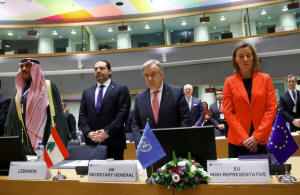|
Russia denies Assad to blame for chemical
attack, on course for collision with Trump
 Send a link to a friend
Send a link to a friend
 [April 05, 2017]
By Maria Kiselyova and Tom Perry [April 05, 2017]
By Maria Kiselyova and Tom Perry
MOSCOW/BEIRUT (Reuters) - Russia suggested
on Wednesday it would publicly stand by Syrian President Bashar al-Assad
despite outrage over a chemical weapons attack, setting Donald Trump's
new U.S. administration on course for a head-on diplomatic collision
with Moscow.
Western countries including the United States blamed Assad's armed
forces for the chemical attack, which choked scores of people to death
in the town of Khan Sheikhoun in a rebel-held area of northern Syria hit
by government air strikes.
Washington said it believed the deaths were caused by sarin nerve gas
dropped by Syrian aircraft. But Moscow offered an alternative
explanation that could shield Assad: it said it believed poison gas had
leaked from a rebel chemical weapons depot struck by Syrian bombs.
Hasan Haj Ali, commander of the Free Idlib Army rebel group, called the
Russian statement a "lie".
"Everyone saw the plane while it was bombing with gas," he told Reuters
from northwestern Syria.
"Likewise, all the civilians in the area know that there are no military
positions there, or places for the manufacture (of weapons). The various
factions of the opposition are not capable of producing these
substances."
The incident is the first time Washington has accused Assad of using
sarin since 2013, when hundreds of people died in an attack on a
Damascus suburb. At that time, Washington said Assad had crossed a "red
line" set by then-President Barack Obama.

Obama threatened an air campaign to topple Assad but called it off at
the last minute after the Syrian leader agreed to give up his chemical
arsenal under a deal brokered by Moscow, a decision which Trump has long
said proved Obama's weakness.
The new incident means Trump is faced with same dilemma that faced his
predecessor: whether to openly challenge Moscow and risk deep
involvement in a Middle East war by seeking to punish Assad for using
banned weapons, or compromise and accept the Syrian leader remaining in
power at the risk of looking weak.
Trump described Tuesday's incident as "heinous actions by the Bashar
al-Assad regime", but also faulted Obama for having failed to enforce
the red line four years ago. Obama's spokesman declined to comment.
Washington, Paris and London have drawn up a draft U.N. Security Council
statement condemning the attack and demanding an investigation. Russia
has the power to veto it, as it has done to block all previous
resolutions that would harm Assad.
"BARBARIC REGIME"
Trump's response to a diplomatic confrontation with Moscow will be
closely watched at home because of accusations by his political
opponents that he is too supportive of Russian President Vladimir Putin.
[to top of second column] |

(L-R) Kuwait Foreign Minister Sabah Al Khalid Al Sabah, Lebanese
Prime Minister Saad al-Hariri, United Nations Secretary General
Antonio Guterres and European Union foreign policy chief Federica
Mogherini observe a minute of silence in respect for the victims of
suspected Syrian government chemical attack during an international
conference on the future of Syria and the region, in Brussels,
Belgium, April 5, 2017. REUTERS/Francois Lenoir

He has previously said the United States and Russia should work more
closely in Syria to fight against Islamic State.
U.S. intelligence agencies say Russia intervened in the U.S.
presidential election last year through computer hacking to help
Trump defeat Hillary Clinton. The FBI and two congressional
committees are investigating whether figures from the Trump campaign
colluded with Moscow, which the White House denies.
The chemical attack in Idlib province, one of the last major
strongholds of rebels that have fought since 2011 to topple Assad,
will complicate diplomatic efforts to end a war that has killed
hundreds of thousands of people and driven half of Syrians from
their homes.
Jihadist groups have a strong presence in Idlib alongside other
rebel groups, some of which have received backing from powers
including Turkey and the United States.
Over the past several months Western countries, including the United
States, had been quietly dropping their demands that Assad leave
power in any deal to end the war, accepting that the rebels no
longer had the capability to topple him by force.
The use of banned chemical weapons would make it harder for the
international community to sign off on any peace deal that does not
remove him.
British Foreign Secretary Boris Johnson, who two months ago shifted
his country's policy by saying Assad should be allowed to run for
re-election, said on Wednesday that he must go.
"This is a barbaric regime that has made it impossible for us to
imagine them continuing to be an authority over the people of Syria
after this conflict is over."
(Writing by Peter Graff; Editing by Sonya Hepinstall)
[© 2017 Thomson Reuters. All rights
reserved.]
Copyright 2017 Reuters. All rights reserved. This material may not be published,
broadcast, rewritten or redistributed.
 |